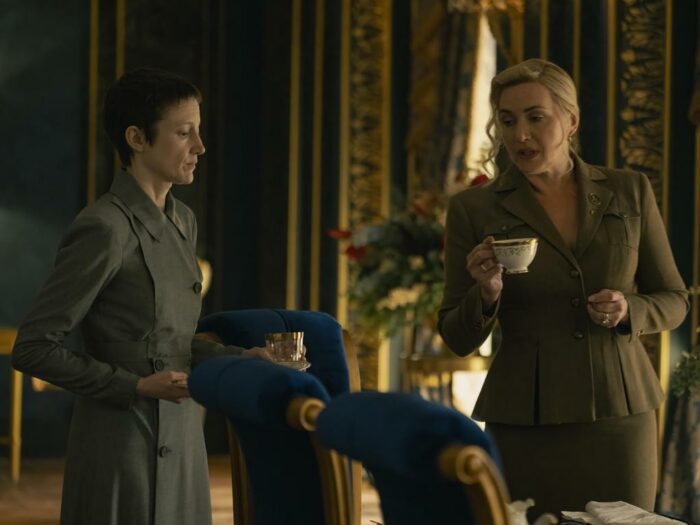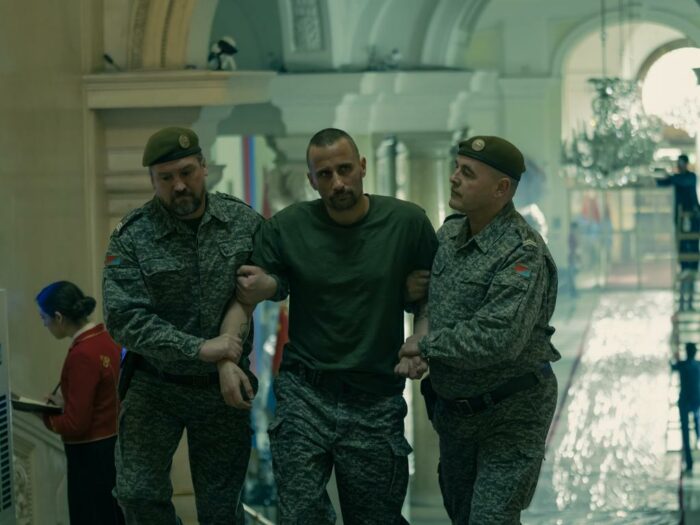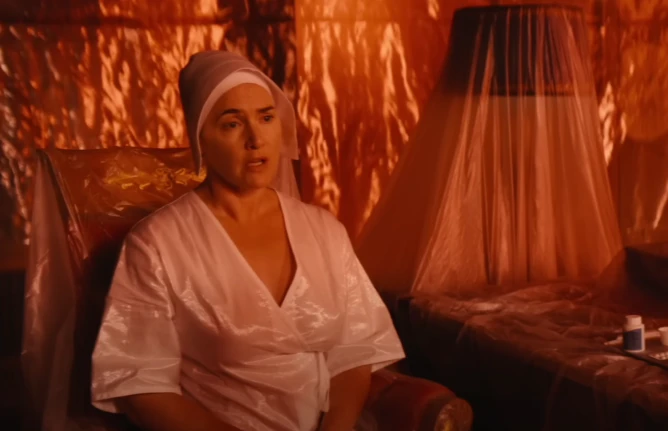The following recap contains spoilers for the premiere of The Regime Episode 1, “Victory Day” (written by Will Tracey and directed by Stephen Frears)
HBO’s highly anticipated new limited series The Regime certainly had the budget, the star, and the pedigree to be something special; unfortunately, in the premiere (“Victory Day”) at least, the series seems uncertain of what it is trying to do in both theme and tone. The Regime is being promoted as a satire but at least here at the start, there is not enough cohesion for any satire to play at all. Perhaps it is supposed to be satirizing capitalistic excess, political obscuration, or how the media portrays public figures. Each of those subjects comes up during “Victory Day” but none of them is dissected with wit or care. So the satire could be all or none of those things, or perhaps something else entirely.
“Victory Day” also suffers from a similar tonal obscurity. The episode is at its best when it is at its most broadly comedic, but the creators seem reluctant to commit to the comedy. It is always fraught to start thinking about what a show could be rather than what it is, but this show certainly could have used some sort of accentuating stylistic excess to make it both funnier and sharper. When the first images came out of the central palace at the heart of the story, I was reminded most vividly of The Grand Budapest Hotel. And I think something of Wes Anderson’s formal style or deadpan delivery would have been a vast improvement to the show as it is.

The Regime has a lot of comedic moments, especially with the palace staff. An upstairs-downstairs type dynamic seems like it might be brewing with the way we get glimpses into the lives of some staff members. Andrea Riseborough’s Agnes, who manages the palace and is always running around throwing shade, seems like she is set to get a lot of great material. Also, her son, Oskar (Louie Mynett), seems primed to have a central role as he is always being tended to not by Alice but by the show’s central character.
And it is with that character that The Regime seems to be having the most fun. Kate Winslet’s performance as Chancellor Elena Vernham is absolutely the central focal point of the show. Winslet plays Vernham as equal parts Eva Peron and Howard Hughes. Winslet is always great and has created some amazing dramatic performances on TV, but this is her first chance to play this much comedy in a series, and she is quite hilarious. Best of all, in the scenes focusing on the chancellor the series doesn’t shy away from getting very weird, and the weirder the show gets the better it is.
Vernham is vain, germophobic, and off-putting, and Winslet leans hard into each aspect of the character. Late in the episode as she is being carried around the palace in a vacuum-sealed chaise, convinced that the mold in the air will kill her, there is a bit of palpable madness that gives the scenes a vitality earlier scenes lacked. The whole sequence plays like a scene from Yorgos Lanthimos’s The Favourite, and while it still isn’t clear what is being skewered, at least the knife is sharp.
The plot of “Victory Day” is not sharp. Vernham brings on Corporal Herbert Zubak (Matthias Schoenaerts) as a personal aide to test the quality of the air before she enters rooms, and over the runtime of the episode, while flipping from being in and out of her graces, he becomes the only person she trusts. Unclear in all of the machinations are the reasons why the most central things happen. Zubak is promoted despite having been responsible for a massacre during a mining strike, and it seems that he and Vernham have some sort of connection. They both talk about the other being in their dreams, but none of that is examined (at least not in “Victory Day”).

This quickly loses relevance though, as Verhnam, while trying to impress an American businessman, gets embarrassed by Zubak and, after slapping him in a back hallway, demotes him to the night shift. The promotion, the demotion, and all of the machinations seem to only be done to service the plot. While on the night shift, Zubak notices an assassin has entered the royal bedroom to kill Vernham and he beats the would-be killer to a pulp. This both sends Vernham into a spiral and gets Zubak promoted, to the only person she will speak to. None of the actions are strange or an issue, and there are some really interesting moments and breadcrumbs laid out, but it also all seems rushed and happening just to set the rest of the plot in motion.
Zubak spends most of the episode in a daze, either overwhelmed by the circumstances or seeming to be. Schoenaerts plays everything about the character close to his vest, so we don’t get to understand much about his perspective, but when we are alone with him the camera takes on a first-person, hand-held, shakiness that is out of sorts with the rest of the scenes, so it is quickly clear he has something happening other than carrying around a humidity tester. Once Zubak and Vernham are alone near the end of the episode, she asks him to tell her what he really thinks and it is then that Zubak, Schoenaerts’ performance, and The Regime itself get interesting.
Zubak goes full agro and rails into Vernham. He says she is capitulating to the Americans, that the common people think she has become weak, and that it is clear her other advisors are causing her physical and mental issues. Schoenaerts sells this well, getting powerful, aggressive, and assertive. And Winslet is the perfect performer on the other side, with her skill in giving nuanced reactions on perfect display. She is scared, angry, and not just a little turned on by this turn from the man. It is clear that no one has stood up to Vernham this way, perhaps ever, though there is a subplot with her father’s corpse that makes me think we will see a mirror of this scene in her past.

This rant causes a change in Vernham. “Victory Day” ends with her giving a speech to the nation indicating that the country will no longer be a puppet of foreign interests and that she has purged the government of her enemies. (Meaning sadly that we have probably seen the last of Pippa Haywood’s hilariously conniving Minister of Finance, Susan.) Everything is set up in those last few moments for the remainder of the season and that ending is just interesting enough to have me ready to come back. The Regime premiere may not know what it is trying to say, but it is pretty hard not to want to watch Kate Winslet saying it anyway.

